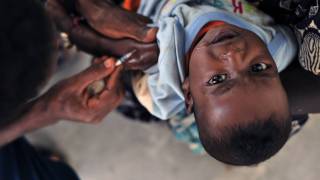Under-Vaccinated Children Remain Unprotected From Disease

New childhood immunization trends during the 2018–19 academic year show that the vaccine exemption rate for kindergarteners rose for the 3rd consecutive year.
And, the national coverage for three basic vaccines (MMR, DTaP, and Varicella) remained near 95 percent, said the Centers for Disease Control and Prevention (CDC).
Additionally, among children born in 2015 and 2016, vaccination coverage was found high and stable for most vaccines, and the proportion of completely unvaccinated children remained small.
These new reports from teams led by the Centers for Disease Control and Prevention (CDC), were published on October 17, 2019, in the latest issue of Morbidity and Mortality Weekly Report.
The CDC’s Advisory Committee on Immunization Practices recommends that children be vaccinated against 14 potentially serious illnesses during the first 24 months of life.
However, there are substantial variations in vaccine coverage and exemption rates by state.
Moreover, according to this new CDC data, almost all states could achieve greater than 95 percent Measles-Mumps-Rubella (MMR) coverage if under-vaccinated nonexempt children were vaccinated in accordance with local and state vaccination policies.
Recent measles outbreaks in states with high overall MMR coverage, such as New York, highlight the need for assessing vaccination coverage at the local level.
The CDC encourages programs to use their local-level school assessment data to identify populations of under-vaccinated students and to partner with schools and providers to reduce barriers to vaccination and improve coverage.
Although the overall percentage of children with an exemption increased slightly for the 2nd consecutive school year, children with exemptions still represent a small proportion of kindergartners nationally and in most states.
More importantly, in 25 states, the number of nonexempt, under-vaccinated kindergartners exceeded the number of those with exemptions.
In many states, nonexempt, under-vaccinated students are attending school in a grace period or are provisionally enrolled.
Fifteen states allow grace periods, with 30 days the most common length, and 47 states allow provisional enrollment for students in the process of completing the vaccination schedule.
Kindergarten vaccination requirements help ensure that students are fully vaccinated with recommended vaccines upon school entry.
The CDC says ‘coverage can be improved with increased access to providers and health insurance, administration of all recommended vaccines during office visits, and more effective patient education about vaccine safety and efficacy.’
‘Such strategies include education campaigns to counteract misinformation in areas with high numbers of vaccine exemptions and increased follow-up of under-vaccinated students without exemptions to ensure these children are vaccinated in accordance with local and state vaccination policies to reduce the risk for transmission of vaccine-preventable diseases’ concluded these CDC researchers.
Immunity is the body’s way of preventing disease. When your baby is born, his/her immune system is not fully developed, which can put him/her at greater risk for infections. Vaccines reduce your child’s risk of infection by working with his/her body’s natural defenses to help safely develop immunity to disease, says the CDC.
Think of it this way: Getting a disease or getting a vaccine can both give you future protection from that disease. The difference is that with the disease you have to get sick to get that protection.
With a vaccine ... you don’t.
Babies are born with immune systems that can fight most germs, but there are some deadly diseases they can’t handle. That’s why they need vaccines to strengthen their immune system.
Vaccines use very small amounts of antigens to help your child’s immune system recognize and learn to fight serious diseases. Antigens are parts of germs that cause the body’s immune system to go to work, concluded the CDC.
Frequently asked questions from Vaccine Information.org help clarify the short and long term benefits to childhood vaccinations.
The findings in these CDC reports are subject to various limitations.
No potential conflicts of interest were disclosed by these researchers.
Vaccine news published by Precision Vaccinations
Our Trust Standards: Medical Advisory Committee

























